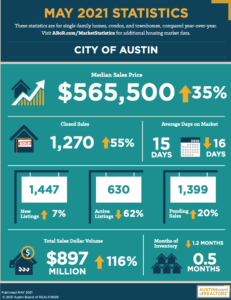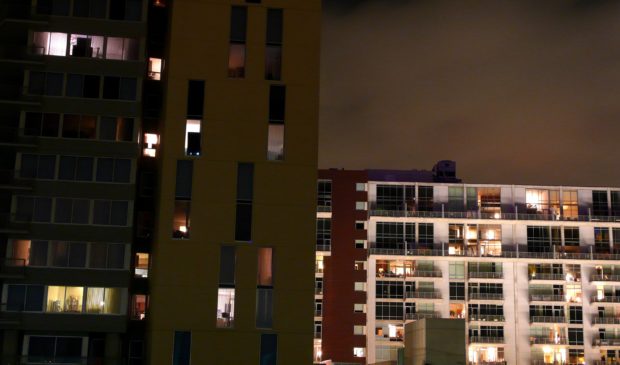Allow ‘diversity of housing types,’ ABoR tells Council
Wednesday, June 16, 2021 by
Jonathan Lee Representatives from the Austin Board of Realtors offered policy recommendations to City Council for ways to slow down the drastic increase in housing prices since the beginning of the pandemic.
The latest housing market statistics are “dramatic,” as Jeni Williams, ABoR’s deputy director of government affairs, put it at Tuesday’s Housing and Planning Committee meeting. Housing prices in Austin have increased 35 percent since last May, and the median sales price of a home has gone up $111,000 since this January to a record $565,500. There was only a 15-day inventory of housing over the last month in the city.
Williams told the committee that while the rest of the country has experienced similar supply crunches and price spikes, Austin’s housing market is exceptional. “Our increases are even higher than everywhere else,” she said.

The Austin Board of Realtors publishes housing market statistics monthly. Infographic courtesy of ABoR.
ABoR CEO Emily Chenevert said that the market fundamentals have not changed much in several years, but the pandemic has thrown an already out-of-control market into further chaos. In order to calm things down, she said, changes are needed. “This is really the same market we were in and it’s the same market we’re gonna be in if we don’t make changes moving forward from a policy perspective.”
“What would you say is our best strategy to try to mitigate the increased rise of housing costs?” Council Member Paige Ellis asked. Williams responded: “Allowing for a diversity of housing types across the city in lots of different places.”
While acknowledging the many factors outside of Council’s control – low interest rates and labor and supply shortages, for example – Williams said diverse housing types “will allow more supply to come online,” thereby taming the rise in housing prices. She predicted that while prices are likely to keep increasing for the foreseeable future, policy could at least slow the rise.
Williams noted that a “diversity in housing types doesn’t have to mean a giant scary development that looks over a single-family home. It can look like a lot of different things.” She offered as an example the proliferation of townhomes in much of Houston.
Ellis agreed. “I do think we need that diversity of housing stock,” she said, pointing to the needs of recent college graduates and elderly people in particular who may be looking for smaller, more affordable homes but find themselves out of luck.
Mayor Steve Adler and some Council members have recently announced that amending the current Land Development Code to allow more housing is a top priority. The city’s comprehensive land use code rewrite was struck down by a judge last year, effectively ending the possibility of a new comprehensive code in the near term. Any land use policies will have to wait until later this summer or during the fall, as Council is currently on break until July 29.
Chenevert said land use planning is only part of the policy conversation. The lengthy review times for new housing projects must also change. “Operationally, we need to continue to look at the planning and development process not just in the context of the tools that are allowed in the code, but the time spent waiting on the permitting.” The drawn-out permitting and review process, she said, is “just expense added to the back end when it comes to bringing that housing unit to market.”
In order to expedite the process, Council recently approved 41 new hires in the Development Services Department.
Council Member Greg Casar ended the meeting on a somewhat optimistic note by saying he “hopes and expects” Council to “come together on common-ground solutions that can address the lack of housing diversity, address the lack of housing in general on the market, so that we can … stop having that continued dip in housing inventory that keeps driving up housing costs.”
Photo made available through a Creative Commons license.
The Austin Monitor’s work is made possible by donations from the community. Though our reporting covers donors from time to time, we are careful to keep business and editorial efforts separate while maintaining transparency. A complete list of donors is available here, and our code of ethics is explained here.
You're a community leader
And we’re honored you look to us for serious, in-depth news. You know a strong community needs local and dedicated watchdog reporting. We’re here for you and that won’t change. Now will you take the powerful next step and support our nonprofit news organization?









